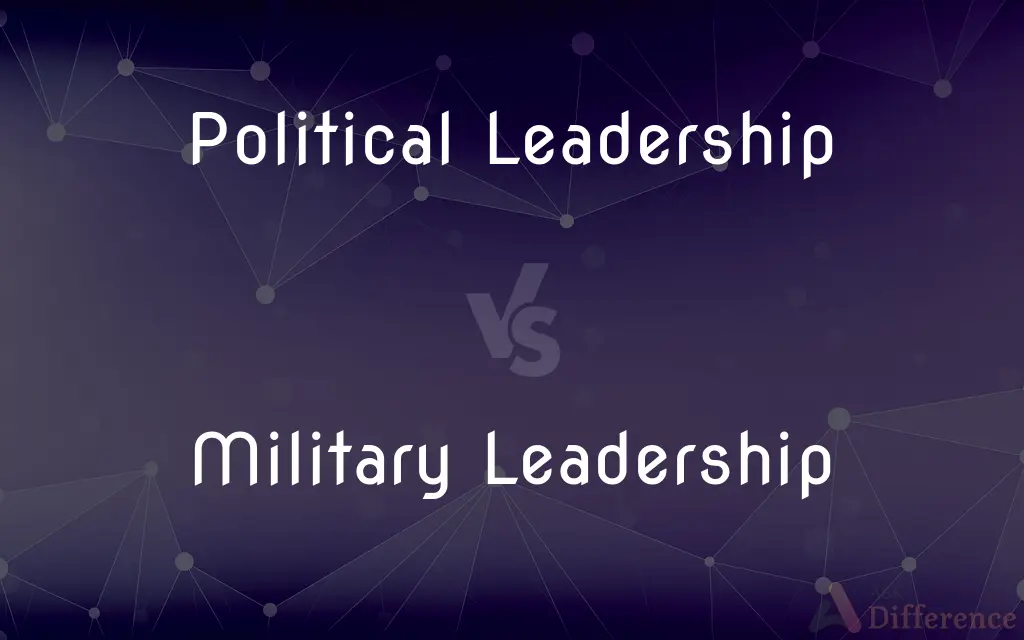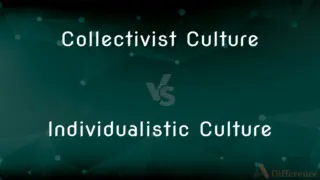Political Leadership vs. Military Leadership — What's the Difference?
By Maham Liaqat & Fiza Rafique — Published on March 23, 2024
Political leadership involves governing a community or nation, focusing on policy-making and public welfare, whereas military leadership is about commanding armed forces, emphasizing discipline, strategy, and mission success.

Difference Between Political Leadership and Military Leadership
Table of Contents
ADVERTISEMENT
Key Differences
Political leadership is centered on the administration and governance of public affairs, aiming to create policies that ensure the welfare of the citizenry. It requires skills in diplomacy, negotiation, and public speaking to effectively communicate and implement these policies.
Military leadership, on the other hand, is focused on the organization, training, and command of military personnel. It demands a high level of discipline, strategic thinking, and the ability to make quick decisions under pressure to achieve specific operational objectives.
Political leaders are often elected by the public or appointed by elected officials, military leaders are usually appointed based on their experience, achievements, and through a hierarchical structure within the armed forces. This difference highlights the varying pathways to leadership in these two domains.
The decision-making process in political leadership often involves a considerable amount of debate, while public scrutiny, and the need to reach a consensus among various stakeholders. In contrast, military leadership typically requires decisive action and strict adherence to commands, with less room for debate or dissent.
Political leadership seeks to address the broad spectrum of societal needs, including economic, social, and cultural issues. Military leadership, while also concerned with the welfare of its personnel, is primarily focused on national defense and security objectives.
ADVERTISEMENT
Comparison Chart
Main Focus
Policy-making and public welfare
Commanding armed forces, strategy execution
Skills Required
Diplomacy, negotiation, public speaking
Discipline, strategic thinking, decisiveness
Path to Leadership
Elections or appointments by elected officials
Appointment based on hierarchy and merit
Decision-making Process
Debate, public scrutiny, consensus-building
Decisive action, command adherence
Primary Concern
Broad societal needs
National defense and security
Compare with Definitions
Political Leadership
Political leadership is the direction and guidance of a political entity.
Abraham Lincoln exemplified political leadership during the American Civil War.
Military Leadership
Military leadership is about mission success.
The success of Operation Desert Storm showcased effective military leadership.
Political Leadership
Political leaders often engage in diplomacy.
Nelson Mandela used his political leadership to negotiate an end to apartheid.
Military Leadership
Military leaders enforce discipline within the ranks.
Sergeant Major Kasal exemplifies military leadership through discipline.
Political Leadership
They are responsible for public welfare.
Angela Merkel focused on the welfare of her country through her political leadership.
Military Leadership
Military leadership is the command and control of armed forces.
General Dwight D. Eisenhower showed military leadership in WWII.
Political Leadership
Political leadership requires public speaking skills.
Martin Luther King Jr. demonstrated exceptional political leadership through his speeches.
Military Leadership
They make quick decisions under pressure.
Admiral Nelson’s military leadership at Trafalgar saved Britain.
Political Leadership
It involves formulating policies that impact society.
Franklin D. Roosevelt's New Deal was a landmark in political leadership.
Military Leadership
It demands strategic thinking and planning.
Sun Tzu’s The Art of War outlines principles of military leadership.
Common Curiosities
How do political and military leadership differ in their main focus?
Political leadership focuses on policy and public welfare, whereas military leadership concentrates on command, strategy, and mission success.
What skills are required for political leadership?
Skills such as diplomacy, negotiation, and public speaking are essential for political leadership.
What skills are essential for military leadership?
Discipline, strategic thinking, and decisiveness are crucial for military leadership.
What is military leadership?
Military leadership involves commanding and managing military personnel and operations, with a focus on discipline, strategy, and achieving mission objectives.
How does the decision-making process differ between political and military leadership?
Political leadership involves debate and consensus-building, while military leadership requires quick, decisive actions.
What is political leadership?
Political leadership refers to the guidance and governance provided by individuals or groups in a political context, focusing on policy-making and public welfare.
How does one become a political leader?
Political leaders are often elected by the public or appointed by those in elected positions.
Can a military leader transition into a political leader?
Yes, many military leaders have transitioned into political leadership roles, leveraging their leadership experience and discipline.
How does one become a military leader?
Military leaders are usually appointed based on their experience, achievements, and hierarchical structure within the forces.
What are the primary concerns of military leadership?
Military leadership focuses on national defense and security.
Do political leaders influence military decisions?
Political leaders can influence military decisions, especially in democratic societies where civilian control of the military is a principle.
What are the primary concerns of political leadership?
Political leadership is primarily concerned with addressing societal needs across economic, social, and cultural issues.
Is it necessary for a leader to have both political and military leadership skills?
While not necessary, having skills from both domains can enhance a leader's effectiveness, especially in roles that bridge civilian and military responsibilities.
Can political leadership impact international relations?
Yes, political leadership plays a crucial role in shaping a country's foreign policy and international relations.
How do leadership styles vary between political and military leaders?
Leadership styles in politics often require more consensus-building and public engagement, while military leadership is more directive and command-oriented.
Share Your Discovery

Previous Comparison
EBIT vs. Gross Profit
Next Comparison
Collectivist Culture vs. Individualistic CultureAuthor Spotlight
Written by
Maham LiaqatCo-written by
Fiza RafiqueFiza Rafique is a skilled content writer at AskDifference.com, where she meticulously refines and enhances written pieces. Drawing from her vast editorial expertise, Fiza ensures clarity, accuracy, and precision in every article. Passionate about language, she continually seeks to elevate the quality of content for readers worldwide.
















































